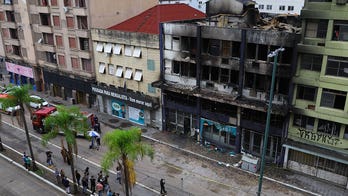A report by a UK-based rights group reveals that fires resulting from ongoing fighting in Sudan have destroyed or damaged 72 villages and settlements, highlighting the use of fire as a weapon of war.

Fires ignited by the raging conflict in Sudan have wreaked havoc on communities across the country, leaving a trail of destruction and displacement in their wake. A report published by Sudan Witness, an open-source project run by the UK-based Center for Information Resilience, paints a grim picture of the devastation caused by the use of fire as a weapon of war.
The report documents 72 villages and settlements that were destroyed or damaged by fires in April alone, the highest number recorded in any month since the conflict erupted in April 2023. The total number of fires since the outbreak of hostilities now stands at 201, a testament to the escalating intensity of the fighting.

The fires have primarily affected villages and towns in the western Darfur region, where the paramilitary Rapid Support Forces (RSF) have been accused of using fire to raze entire villages. The Center for Information Resilience's analysis shows a surge in fires particularly in the north and west of el-Fasher, the capital of North Darfur state.
El-Fasher recently witnessed intense clashes between the Sudanese military and the RSF, resulting in the deaths of at least 27 people and the displacement of over 800. The fighting was followed by an airstrike by the Sudanese military that hit close to a pediatric hospital, killing two children and a caregiver.
According to Anouk Theunissen, director of Sudan Witness, the data collected by the project indicates a systematic use of fire as a weapon of war. "We've documented the patterns of numerous fires and the continuing devastation to settlements around western Sudan, large and small," she said.
When clusters of fires coincide with reports of fighting or airstrikes, it suggests that fire is being used indiscriminately to inflict damage and displace civilians. Theunissen emphasized that this trend is worsening and leading to the mass displacement of Sudanese people.
The conflict in Sudan began with tensions between the Sudanese military and the RSF, which escalated into intense fighting in the capital, Khartoum, in April 2023. The clashes quickly spread to other parts of the country, including Darfur, which has been plagued by brutal attacks.
The Sudan Witness analysis also reveals that at least 51 settlements for displaced people have been hit by fires more than once, indicating a deliberate targeting of vulnerable communities. Investigators with the project used social media, satellite imagery, and NASA's public fire monitoring data to examine the patterns of fires across the war-torn country.
The use of fire as a weapon of war has severe humanitarian consequences, destroying homes, infrastructure, and livelihoods. It also exacerbates food insecurity and malnutrition, as fires often destroy crops and livestock. The international community has condemned the use of fire in Sudan and called for accountability for those responsible for such atrocities.










